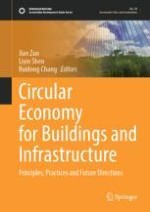2024 | OriginalPaper | Buchkapitel
3. Inclusive Construction Management: Insights and Recommendations by Matching Analysis on Circular Economy (CE) and Sustainable Development Goals (SDGs)
verfasst von : Liang Dong, Xin Bian
Erschienen in: Circular Economy for Buildings and Infrastructure
Aktivieren Sie unsere intelligente Suche, um passende Fachinhalte oder Patente zu finden.
Wählen Sie Textabschnitte aus um mit Künstlicher Intelligenz passenden Patente zu finden. powered by
Markieren Sie Textabschnitte, um KI-gestützt weitere passende Inhalte zu finden. powered by
